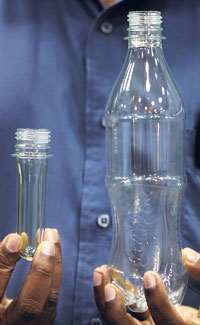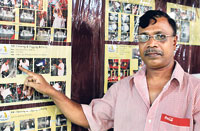“There is a need to invest a lot of money as demand is growing and new areas (in the North and East) are opening out,” said Patrick Pech, Country Manager - Coca Cola Beverages Sri Lanka Ltd, at the company’s only plant at Biyagama. The company reported a Net Sales Revenue (NSR) of Rs 4.49 billion in the calendar 2009 year (ending 31st December), up 14.8% from the previous year.

Patrick Pech reflects, Pic by M. A. Pushpakumara |
The labour unrest in the mid 1990s came during the time the company changed hands in 1994 from Pure Beverages Ltd, which had the franchise since 1955, to Fraizer & Nieve Coca-Cola (Pty) Ltd, the Singapore-based anchor bottler and subsequently to the South African bottler for coke.
All that is now water under the bridge for the world’s largest carbonated drinks-maker here and two examples of the good relationship (more of a partnership) between management and the workforce developed over the years are the fish pond in the near 21-acre complex, and workers doing other jobs outside their designated assignments.
The fish pond contains treated waste water from the plant which is sent into the river. In an interview with the Business Times in April, Ahmet Bozer, President of Eurasia and Africa of The Coca-Cola Company, one of the global company’s biggest executives to visit Sri Lanka, referred to the company role vis a vis the environment where he referred to the fish pond.
“We have goals that apply to all the plants in the area of water. We expect all our plants to reduce their water use in production; we expect our waste water quality not only to meet local law standards but be of a quality that can sustain fish life. All plants have that objective aimed to achieve by (end) 2010,” he said in April.

Full blown bottle from Small tube
|
The waste water goes through several cycles of treatment to make it as good as clean, drinking water before being pumped into the river. Similarly water pumped from two large wells and bore holes in the premises goes through one of the most rigid treatment processes before use.
The years 2008, 2009 and 2010 have and is looking to be happy ones for the Sri Lankan unit as it garners a whole heap of awards within the SABCO (South Africa bottler) Group.
The company produces and sells over 10-million unit cases of carbonated soft drinks (both still and sparkling) per annum, operating through 60,000 outlets. According to recent research, Unilever has the largest number of outlets at 130,000 outlets across the country followed by Munchee (120,000), Nestle (110,000), Maliban (100,000) Fonterra (80,000) and, Coca Cola and Procter & Gamble (60,000 each).
Mr Pech said that at the annual SABCO events, the Sri Lankan unit collected a whole heap of awards including the ‘Country of the Year’ in 2008 which resulted in the annual conference for SABCO units being held in Colombo in April.
Among the good practices’ awards it won were for water management. “Last year we were able to reduce water use by 22%. Over the past 6-7 years, we have reduced water use to 2-3 litres of water for one litre of beverage in 2009 from nine litres (of water),” he said.

Machine operator R.H.N. Ranasinghe
|
The CEO award was received after the company won plaudits for growing the NSR more than volume and thus controlling costs.
The third award was for best practices where the company made improvements to Line 1 of the production by investing in a blower machine, which helped to delay investment in the rest of the line by a year. Mr Pech said this enabled a savings of $1 mln as a new machine costs $10 mln and the savings came from 10% interest per year.
“We have a very good understanding between the entire team here – management and workers,” he said discussing another award that was won: Sponsorsing, helping and guiding an Ampara school.
“We are excited because all these awards are for competencies in our work environment,” he said.
The company has been installing coolers over the years in outlets which is what is driving demand and growth. Currently the number of 17,000 coolers in outlets is set to grow by another 3,000 this year.
During a walkaround through the entire floor area: production lines, stacking, mechanical, water treatment, etc, it was evident that the company invests a lot of time and money on systems, procedures and quality control. While the plant is fully automated, workers are stationed at key areas in the bottling process checking bottles to make sure they are clean, has no impurities and contains the same quantity per bottle.
The company has invested in additional water treatment facilities which will be put into use once a new line is is installed next year, raising production and output. |
